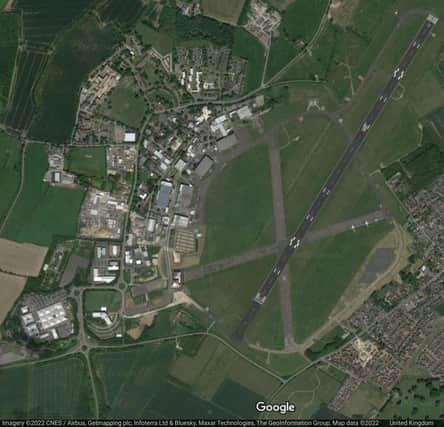Aerospace company's move to Cranfield Airport given the green light despite objections over noise and traffic


A prestigious planning project for Bedfordshire contributing more than £130m a year to the regional economy could come at a cost for residents living by Cranfield Airport, a meeting heard.
But the benefits of attracting Marshall of Cambridge (Holdings) Limited to relocate its base to the village are deemed sufficient to outweigh the industrial scale decibel count from engine testing.
Advertisement
Hide AdAdvertisement
Hide AdThe company submitted outline plans for the maintenance, repair and overhaul of aircraft with associated research and development activity, and up to 16 aircraft hangar bays on land north of the airport in College Road.
The project includes building aprons, taxiways and runway works, upgrades of aeronautical ground lighting and navigational aids, offices, workshops and storage buildings, and an aircraft engine ground running enclosure, according to a report to Central Bedfordshire Council’s development management committee.
There are also demolition works, security gate houses, electrical substations, parking and landscaping, as well as modifications to public rights of way and to the Crawley Road, College Road, Astwood Road junction, said the report.
“As the application is complex, it’s accompanied by an environmental impact assessment,” senior planning officer David Gauntlett told the committee.
Advertisement
Hide AdAdvertisement
Hide Ad“The applicant Marshall Aerospace is a prominent supplier to a number of international air forces and works mainly on military transport aircraft, more commonly known as the Hercules 130,” he explained.
“The company operates out of Cambridge City Airport and planning permission would facilitate a relocation of its operations to this site.”
There were 130 representations, with 107 objections. Cranfield Parish Council opposed the proposals on noise grounds, while Marston Moretaine Parish Council welcomed the employment opportunities, but raised traffic concerns.
Noisier aircraft will be introduced to the airport, although the 1,500 air transport movements are fairly minimal with three to four a day, he said.
Advertisement
Hide AdAdvertisement
Hide Ad“Engine testing is the area which will result in identified harm through noise and disturbance. Testing will occur two or three times a week for a maximum of four hours.
“Harm has been identified from the potential of testing performed on the open runway and this will be extremely noisy. But this is infrequent and only happen in exceptional circumstances.
“The applicant has advised that engine testing is an essential operation of its business. Testing is limited by controls, with none during the evening or overnight periods.”
A Marshall spokesman said: “The aircraft we modify and maintain are used for a wide range of transport and humanitarian work.
Advertisement
Hide AdAdvertisement
Hide Ad“Moving to Cranfield will enable us to build a state-of-the-art facility to deliver on our growth plans and provide a mix of jobs estimated to bring more than £130m annually to the benefit of the region.
“Our proposals include more stringent operating controls than at present. This would be instead of the current consented air park scheme.
“We’ll be replicating the model which has served us so well in Cambridge. We want our move to Cranfield to create a legacy which goes well beyond just economic impact.”
The development was approved with nine votes in favour, one against and one abstention.